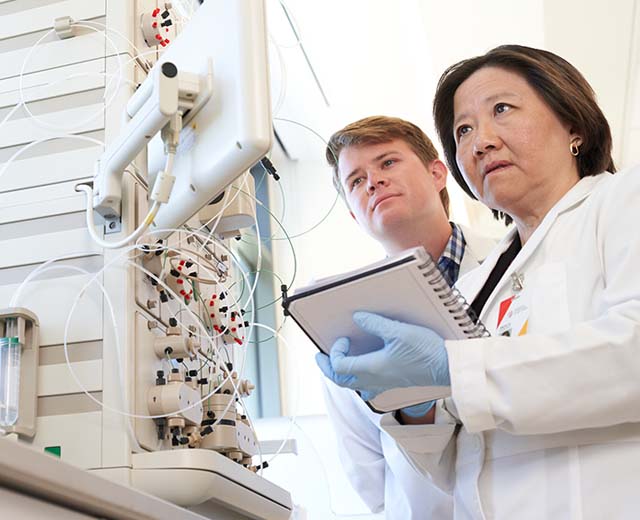This article was originally published February 13, 2023, and was updated June 30, 2025 to reflect updates to the program and current job outlook data.
The healthcare industry is a large sector of the economy that offers a variety of career opportunities. The need for healthcare professionals isn’t limited to more nurses and doctors. Administrative professionals are also in demand as the healthcare sector continues to expand, with the industry having an expected average growth rate of 29 percent from 2023 to 2033 and a median annual salary of $117,960 in 2024. A Master of Science in Healthcare Administration (HCAD MS) can prepare you to build a career in this fast-growing industry.
“Individuals that are seeking to grow professionally within the healthcare field could significantly benefit from this degree, allowing for a variety of healthcare administration roles to be available to them once they complete their HCAD MS,” says Christina Gardiner, PhD, collegiate faculty in global health management and administration portfolio at University of Maryland Global Campus (UMGC). “Pursuing this degree from UMGC is valuable because our program supports students in learning about current managerial, leadership, and administrative duties that address the entire healthcare ecosystem from a national level to a global perspective.”
What do students learn in a Master of Science in Healthcare Administration program that prepares them for healthcare management positions?
A master’s degree can help prepare students for senior-level positions throughout the industry, enabling students and professionals to achieve their career goals. At UMGC, the program equips students with an enhanced understanding of the healthcare delivery system from operations to finance, while furthering their development in areas such as strategic thinking, innovation, problem-solving, and meaningful leadership.
“Students enrolled in the program learn a wide array of skills, from managing an entire healthcare facility or healthcare system to operating a department within a specific healthcare setting,” says Gardiner. “The healthcare administration topics that are taught in our program include finance, emergency management, public health, quality management, policy development, staffing, regulations, physical plant operations, healthcare marketing, leadership, and so much more!”
Many of the skills students learn in the program can be directly applied to their current careers as well. Jordyn P. graduated from UMGC in 2025 with a Master of Science in Healthcare Administration, and she hopes to be part of the evolving change within healthcare.
“I feel like my focus was always just respecting the doctors and the nurses, but now I have a newfound respect for the administrative staff after this degree,” said Jordyn P. “I'm able to take my skills from my leadership and healthcare administration class and apply it at work.”
What kind of jobs are possible with a Master of Science in Healthcare Administration?
The experience students gain with this degree can apply to a range of jobs. A Master of Science in Healthcare Administration can help students gain the skills and credentials needed to transition into a leadership or management role, and those career opportunities are available in almost every sector of healthcare - from hospitals and government agencies to nonprofits and global health systems.
“A student’s interest and time spent within the healthcare industry can help determine the type of jobs or career path they can seek,” says Gardiner. “For example, a student that has only been working in the healthcare industry a few years could seek roles like a hospital or clinic administrator, director of operations, practice manager, healthcare consultant, regional manager, or healthcare project manager. If a student has been in the healthcare industry longer and is seeking their master’s degree to further their career, other roles that could be available include Chief Executive Officer, Chief Operating Officer, Chief Financial Officer, Vice President, hospital executive, or similar higher level executive roles.”
How does UMGC’s Master of Science in Healthcare Administration program differ from other programs to help students succeed?
Built on a competency-based, practitioner-informed model, the program is designed to immediately apply to your career. Students at UMGC gain expertise in strategic healthcare leadership, financial management and budgeting, regulatory compliance and health law, long-term care operations, and public health administration.
“The Master of Science in Healthcare Administration model at UMGC is different because we provide students with a solid foundation in healthcare administration that translates to the current healthcare marketplace,” says Gardiner. “As an educational leader within the healthcare industry, our program focuses on giving students the knowledge, skills, and abilities to make an impactful positive impression in the highly complex healthcare environment.”
Courses in this program help you prepare for the Fellow of the American College of Healthcare Executives (FACHE) and Certified in Public Health (CPH) certification exams. The program aligns with industry-leading frameworks such as the National Center for Healthcare Leadership (NCHL) competency model, and UMGC is a registered member of the American College of Healthcare Executives (ACHE) Higher Education Network.
UMGC’s faculty are industry professionals who have worked or currently work within the healthcare field. UMGC professors translate the course content into meaningful skillsets that support professional growth, allowing students to develop their skills to achieve their long-term career goals. This program has been designed to support working adults, and the curriculum allows for flexibility by applying an online format that supports today’s working professionals. UMGC recognizes the demands of working in the healthcare industry and works to provide students with the ability to continue in their professional roles while pursuing their academic goals of earning a master’s degree.
“If you are a healthcare professional who wants to have a competitive edge in the marketplace, then pursuing your Master of Science in Healthcare Administration could be the best option for you,” says Gardiner. “This career path is considered a highly sought-after profession that has a world of endless possibilities, allowing those that seek this opportunity to make a difference as a healthcare leader.”
UMGC is a constituent institution of the University System of Maryland and has an accreditation from the Middle States Commission of Higher Education. In addition to the Master of Science in Healthcare Administration program, UMGC also offers a bachelor’s degree in health services management and a variety of undergraduate and graduate certificates within the healthcare field. Advancing your education in healthcare can help you gain the professional development to maximize your potential in this era of rapid healthcare transformation.
1 Medical and Health Services Managers: Occupational Outlook Handbook, U.S. Bureau of Labor Statistics, April 18, 2025.
Reference on this webpage to any third-party entity or product does not constitute or imply endorsement by UMGC nor does it constitute or imply endorsement of UMGC by the third party.

/blog-banner-linklist-nursing-degree-programs_shutterstock_2483848893.jpg)

